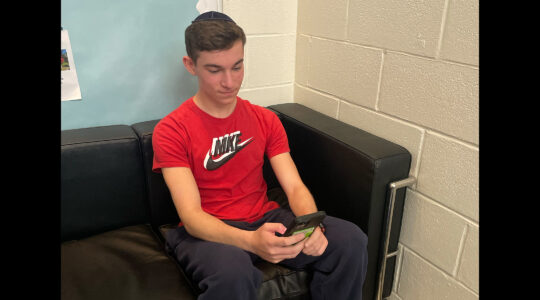In keeping with their message of youth engagement, the J Street conference featured a panel of speakers from several campuses across the country.
Giving their two cents about campus dialogues about Israel were representatives from Hampshire College (of false-Israel-divestment-accusation fame), University of Maryland, University of Colorado at Boulder and Harvard University.
Panelists agreed that tensions within Jewish groups and between student organizations of various faiths played a significant role in student life and continues to be an ongoing problem.
When asked about the specific nature of these tensions, Hampshire College president Ralph Hexter replied with a chuckle "What tensions don’t I face?" Hexter referred to accusations earlier this year that his institution had divested from Israel. These claims, most notably made by political commentator Alan Dershowitz, were later reversed. Dershowitz, as fate may have it, is in fact the parent of a Hampshire College alumnus. On a lighter note, Hexter said that the back and forth between school and pundit was in fact an excellent example of how the school takes care to maintain good relations with the extended Hampshire College family.
According to David Shneer, associate professor of History and director of the Program of Jewish Studies at University of Colorado at Boulder, one way to reduce tensions is to teach politics, but not to preach it.
"It is not the place for professors to politicize their classrooms," stressed Shneer. Instead, he advocated that professors give their students the tools to understand the political landscape, allowing them to then form their own opinions. Shneer even invoked AIPAC (an oft-whispered name at J Street’s conference), saying he was proud of students who became engaged with the group after concluding his class. It makes him happy, said Shneer, to see his students being active.
Aimee Mayer, member of the J Street U’s student board of directors and president of the University of Maryland J Street U, spoke about the tensions between Jewish, Muslim and Palestinian groups at her university. At times, conflicts got so out of hand that the school required fighting groups to complete mandatory dialogue sessions moderated by the University of Maryland’s student union.
However, Dr. Bernard Steinberg, president and executive director of Harvard Hillel, noted that if relationships between groups are nurtured, meaningful and productive bonds can be formed. Steinberg related a story which took place at Harvard earlier this year during the Israeli operation in Gaza, when groups representing views on both sides of the debate decided to jointly host a vigil for the human lives lost.
When Harvard University turned down their request to hold the event at Harvard Yard, citing what Steinberg called bureacratic reasoning (Harvard said lit candles violated the university’s fire code, but Steinberg believes Harvard wanted to avoid possible negative press), the Jewish groups sheepishly offered the Harvard Hillel’s court yard as a substitute. Knowing that Hillel was hardly neutral ground, Steinberg said the Jewish groups would have considered it reasonable if the Muslim and Palestinian groups turned down the offer. However, they accepted. Steinberg pointed to this story as an example of how a living relationship between Jews and Muslims can be built, and touted it as a model for interactions on college campuses and beyond.
JTA has documented Jewish history in real-time for over a century. Keep our journalism strong by joining us in supporting independent, award-winning reporting.





